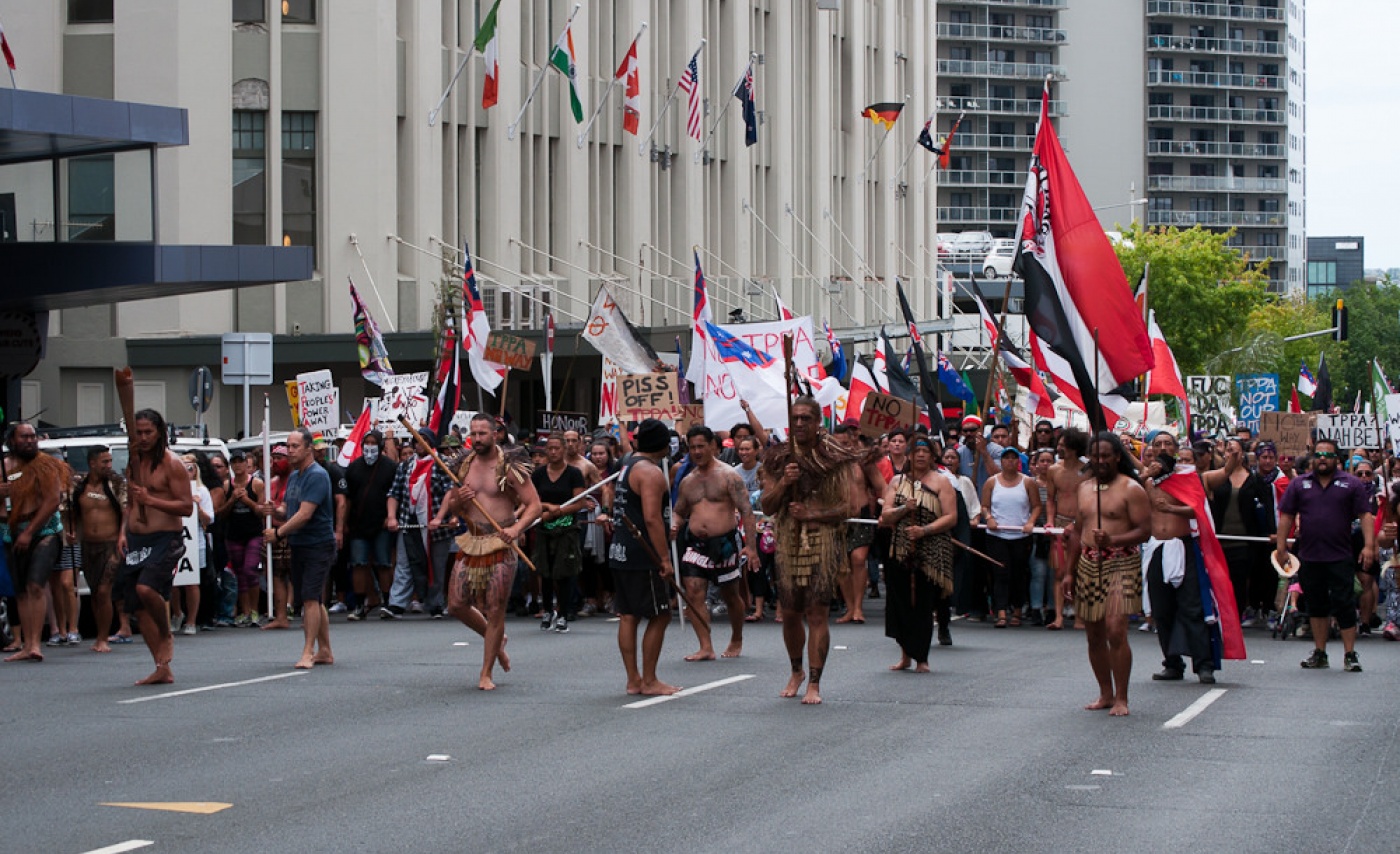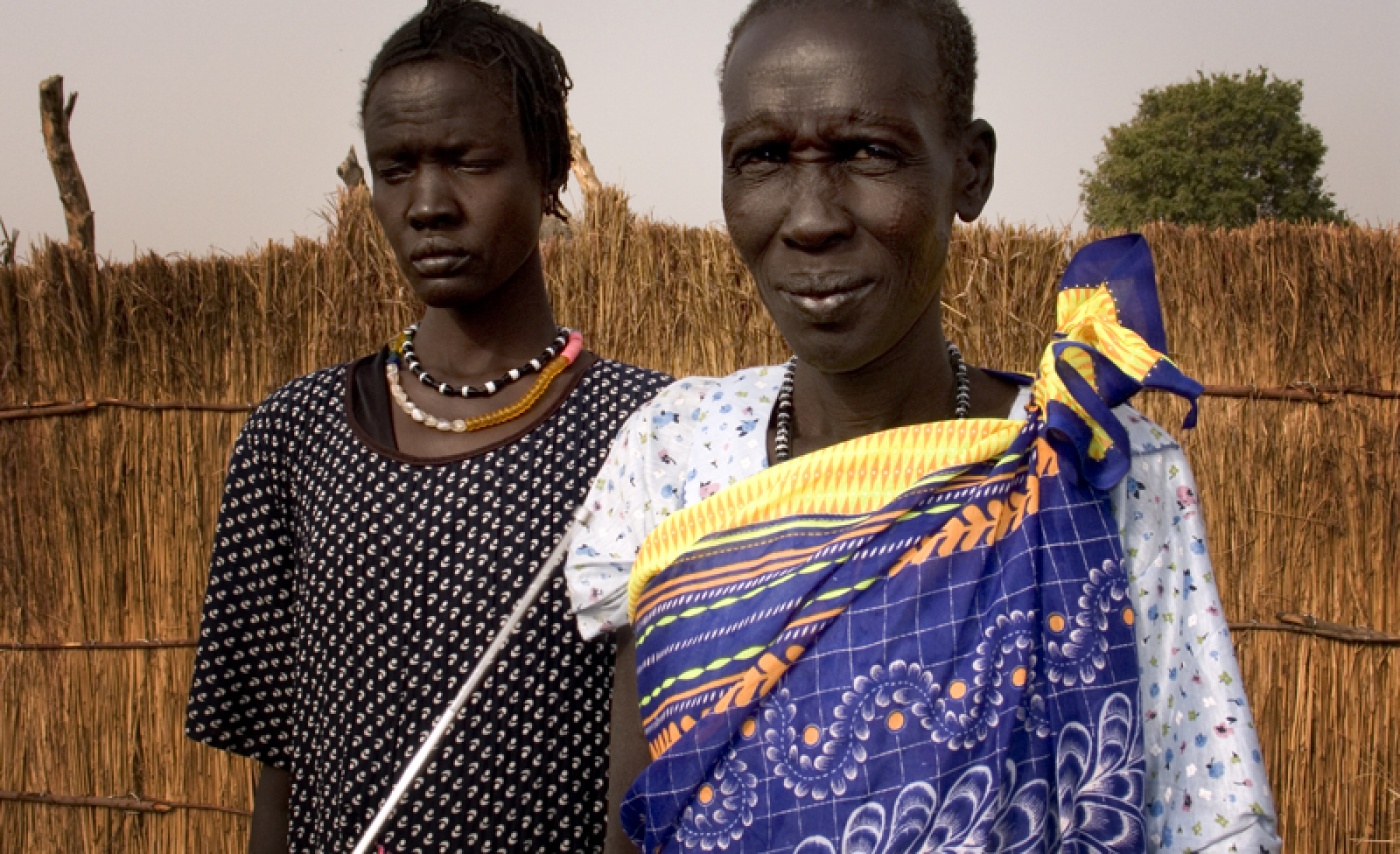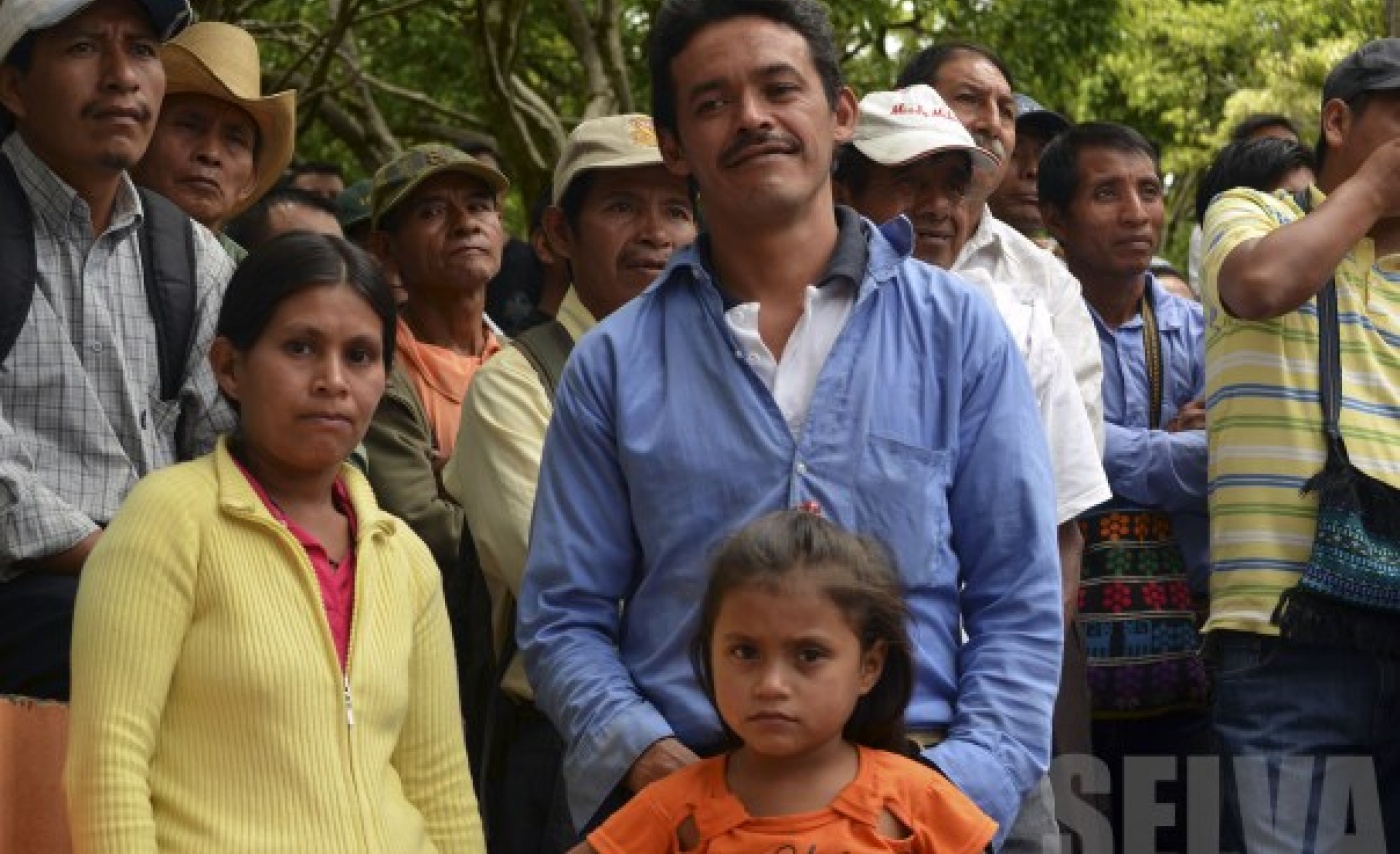
by Deep Green Resistance News Service | Feb 19, 2016 | Colonialism & Conquest, Indigenous Autonomy
Featured image: Maori protests on February 4th signing of the TPP in Auckland, New Zealand. Photo by Dominic Hartnett
By Cultural Survival
The Trans-Pacific Partnership agreement, if approved, would be the largest trade agreement in history involving 11 countries including the United States, Australia, Brunei, Canada, Chile, Japan, Malaysia, Mexico, New Zealand, Peru, Singapore, and Vietnam.
Cultural Survival staff caught up with the United Nations Special Rapporteur on the Rights of Indigenous Peoples, Victoria Tauli-Corpuz, to discuss the trade deal’s implications for Indigenous Peoples in these countries, based on her recent research and report on this topic.
Vicky Tauli-Corpuz explains that the TPP agreement is about liberalizing the trade and investment regime in order to allow for more fluidity when trading among countries. However, she shared her concern that in this agreement investor’s rights may be more protected than the rights of the Indigenous Peoples; the investment clause would trump social and environmental rights, including human rights.
“You cannot have a situation where investor’s rights are more protected than Indigenous rights,” she explained.
Ms. Tauli-Corpuz also used the example of Bolivia, where the government had listened and acted upon Indigenous protests against a Canadian mine on their lands, by attempting to cancel the concession. Bolivia was then sued by the Canadian corporation that owned the mine. The mining corporation won and the Bolivian government was left to pay millions of dollars to the company for lost profits. She noted that most developing countries lose in arbitration with corporations because they simply do not have the lawyers to support them. Corpuz warned, these are the types of situations that occur when investors are prioritized over the local and Indigenous citizens.
The TPP was negotiated in secret, and its text was only released via Wikileaks until it was already negotiated by trade ministers of the respective countries. According to Tauli Corpuz, this secrecy is a violation of Indigenous Peoples right to Free, Prior, Informed Consent on policies that may affect them.
“In situations where Indigenous Peoples have the right to Free, Prior, Informed Consent before any company comes to their community to invest, that kind of right has to be respected and that has to be stated and pursued by the countries who are hosting this investment,” she warned.
She urges for deeper transparency in trade deals like the TPP, so that Indigenous Peoples can be aware of the content of these trade agreements so that they can participate and decide whether or not to consent. In order to achieve this there must be a call to action to create a more participatory negotiation process rather than the exclusive and secretive one that has occurred. If the TPP is passed within each country’s legislature, it would deregulate social standards that are put in place and can take states themselves to court for attempting to protect social conducts such as protecting the rights of Indigenous Peoples.
The Special Rapporteur also recommends that extra attention be made to Exceptions section of the trade agreement. For example, specifically naming FPIC and Indigenous Peoples rights in the stipulations of how the the trade agreement would play out within each country. It is the responsibility of each country to identify and present exceptions so that they can be held accountable during arbitration panels. For example, New Zealand did manage to include an exception in TPP article 29.6 that references the rights of the Maori people, however activists have argued that the wording of the exception allows too many loopholes to provide legitimate protection.
On February 4th, 2016, the TPP was signed by trade ministers of 11 countries, in a formal ceremony in New Zealand. But the deal must still be approved within the legislatures of each country for it to be put in place: The TPP will not come into effect until a requisite number of original signatories ratify the agreement.
Maori leaders in New Zealand held massive protests against the signing ceremony, saying that they do not give their consent to the deal and that the it violates the Treaty of Waitangi and the 1835 Declaration of Independence of New Zealand. Kingi Taurua, a prominent Nga Puhi elder at Waitangi’s Te Tii Marae, has sent a formal notice of veto of the Trans-Pacific Partnership agreement to the embassies and trade departments of its proposed partner countries. They argued that the New Zealand government does not have “due authority” to sign the TPP without the agreement of Maori elders, “which [agreement] has not been given.”
In the United States, the next step is the drafting and consideration of a bill in Congress to implement the agreement, which will also serve as U.S. ratification of the international trade deal. Some anticipate this vote to take place after the 2016 elections in November.

by Deep Green Resistance News Service | Feb 1, 2016 | Agriculture, Colonialism & Conquest
Featured image: Two Anuak women in the Gambella Province of Ethiopia. By Julio Garcia on March 18, 2007.
By Cultural Survival
On December 28, 2015 Ethiopia’s Agricultural Ministry revoked their contract with Karuturi Global Limited, an Indian company who in 2010 won a concession for 100,000 hectares of land to be developed for industrial agriculture for export in the Gambella region of southern Ethiopia, home to the Indigenous Anuak, Mezenger, Nuer, Opo, and Komo peoples. The Agricultural Ministry’s land investment agency cancelled the concession on the grounds that by 2012 Karuturi had developed only 1,200 hectares of land within the initial two year period of the contract.
Since 2013 the company began spiraling out of control, when it was found guilty of tax evasion in in a similar land grab venture in Kenya, and the following year had its operations was taken over by Stanbic Bank.
Karaturi’s Managing Director Sai Ramakrishna has challenged the Agricultural Ministry’s project termination in Ethiopia, telling Bloomberg Business, “I don’t recognize this cancellation,” and is seeking arbitration. If international arbitration is granted, Karuturi will advocate for the continuation of the company’s commercial agriculture plan. Ethiopian officials have dismissed their claims.
Karuturi Global’s project failure resembles that of many foreign investors who have purchased land under the Ethiopian government’s push to lease Indigenous lands to foreign investors, in what many term “land grabbing.” According to Bloomberg, none of these farms in Ethiopia have reported any success in exporting crops.
Ethiopia’s land leasing plans were described as a roadmap to development. Called “villagisation,” the plan involved removing the Indigenous Peoples who sustain themselves from their lands practising farming, hunting, gathering, and pastoralism, and grouping them into established villages, with the idea that the land would be used to produce large scale industrial agriculture to sustain the population’s food needs. Jobs would be created, turning Indigenous Peoples into wage workers who could then buy foods. But Karaturi’s plans were different–aiming to export grains for sale abroad rather than selling them locally, despite Ethiopia’s ban on the export of cereal crops.
The socio-economic transformation promised by the regional government was never realized. Rather, villagisation has meant the forced removal of Indigenous Peoples from their ancestral lands and the creation of an aid-dependant food source. Obang Metho, Anuak human rights activist from Gambella, explained in a video with local media Ethiopian Satellite Television, “This was not empty land. People have been living on this land for generations. When I grew up we didn’t have an office job to earn wages, people depend on land. Our supermarket is going to the field. The field was our bank. When you take away our lands, you are taking away our livelihood, our futures.”

An aerial view of the Dadaab Refugee Camp in Kenya where many Anuak people turned to for shelter after forced removal from Gambella. Photograph taken on November 1, 2011 by Oxfam International
On a morning in late 2010 the Anuak peoples living in the province of Gambella were met by regional government officials and soldiers. Without their knowledge or consent the Ethiopian government had sold an estimated 42% of Anuak land to foreign investors. The Anuak people were forced to leave their only known livelihoods, including essential food sources, and move to government sponsored “villages” which soon turned into refugee camps. In 2012, Human Rights Watch published its report, “’Waiting Here for Death’ Forced Displacement and “Villagization” in Ethiopia’s Gambella Region” documenting the “forcible moving tens of thousands of indigenous people in the western Gambella region from their homes to new villages under a ‘villagization’ program.”
“In their old village there was a school under a mango tree. In the new village, donor money had paid for a new school building. The children, however, were too hungry to attend, roaming instead in the forest looking for food… but now the government can show the world there is a ‘school’” –Anuak refugee displaced to the Dadaab Refugee Camp in Kenya (from The Guardian’s article, Ethiopia’s rights abuses ‘being ignored by US and UK aid agencies’.)
Since their displacement in 2010 the Anuak have become refugees – many having turned to the crowded refugee camps in South Sudan and Kenya. As a result of their forced displacement many of the Anuak, and other Indigenous Peoples of the southwest, have endured scores of human rights violations including documented cases of rape, torture, extrajudicial imprisonment and famine, while these conditions were ignored by donor agencies USAID and DfiD.
Now, Ethiopia, USAID and Dfid have a chance to right their wrongs, and return the lands to the Indigenous Peoples turned into development refugees. But the Agriculture Ministry has said that the rest of the land will return to a “land bank” for future re-investment.
The UN Declaration on the Rights of Indigenous Peoples clearly states in Article 28.1
Indigenous peoples have the right to redress, by means that can include restitution or, when this is not possible, just, fair and equitable compensation, for the lands, territories and resources which they have traditionally owned or otherwise occupied or used, and which have been confiscated, taken, occupied, used or damaged without their free, prior and informed consent.
For the survival of the Indigenous Peoples of Gambella, International aid agencies must take an active role to bring these displaced communities access to lands and a means of sustainable livelihoods.

by DGR Colorado Plateau | Nov 3, 2015 | Indigenous Autonomy, Repression at Home
By Cultural Survival
Two Q’anjobal Maya community leaders who were imprisoned in Guatemala for the past two years, have finally been declared innocent and released. A regional Guatemalan criminal court found the two men to be absolved of all charges on October 28, 2015.
Rogelio Velasquez and Saul Mendez had been unfairly imprisoned as a result of their activism organizing against a Spanish hydroelectric dam project in their town of Santa Cruz Barillas, Huehuetenango. The two men have had a long trajectory as community leaders, participating in the organization and promotion of a community consultation in 2007 and again in 2011, in which members of the Indigenous Q’anjobal Maya community voted overwhelmingly to reject any outside companies from conducting resource exploration or extraction. The Spanish company has ignored these demonstrations; rather than respecting the autonomy of the community, have pushed violently and aggressively forward with their plans for a dam on the sacred Qam Balam river. Velasquez’ and Mendez’ villages were the first to rise up against the dam, as they were the most likely to be affected by the project.
This is the second stint that the men have done in prison. In May 2012, they were arbitrarily detained in Barillas after protesting outside of military headquarters after the assassination of their neighbor and fellow community leader Andres Francisco Miguel. Along with along with seven other men, they were illegally held in prison for 8 months, until finally being released in January 2013 after no charges were brought against them. In November 2012, the UN Working Group on Arbitrary Detention emitted a statement 46/2012 confirming that these arrests were arbitrary.
Then, eight months later, two men dressed as police officers- but lacking any police identification- detained Velasquez and Mendez and put them back in prison. Later charges were filed accusing the men of having “participated’’ in a public lynching that occurred three years earlier in 2010. Mendez and Velasquez have maintained their innocence.
In an interview the day before their trial on the 28th, Prensa Comunitaria reported that after two years, 2 months and one day in prison, the men remained as lively as ever. “We kept a promise to the town of Barillas and its people. We are in prison for defending what belongs to the community and that’s why we know that the people will support us,’’ they said. The men have lived in constant worry about their wives and children, the harvesting of their corn fields, and whether their families have had food to put on the table. They were forced to learn how to find hope even at the darkest of moments; Rogelio Velasquez has dedicated his time to learning to read and write. Saul Mendez has been weaving, creating sachels and bracelets decorated with the word “Libertad’’.
Arbitrary detention and the criminalization of human rights defenders has become a rampant epidemic in Guatemala, especially against Indigenous leaders.
The UN Office of the High Commissioner summary of stakeholder submissions to the Human Rights Council Working Group, during the Universal Periodic Review of Guatemala in 2012 noted,
“HRDs [Human Rights Defenders] continue to face death threats, physical attacks, killings and other forms of violence, mostly carried out by clandestine security organizations and illegal groups… The illegitimate use of criminal proceedings against HRDs prevented them from carrying out their legitimate activities… The worsening situation of human rights defenders was directly related to the failure to address land conflicts and the repressive policy pursued against indigenous communities who object to the use of their natural resources without prior consultation.”
The threats to the safety of Indigenous human rights defenders are growing, and it is left to be seen how Guatemala’s new president-elect Jimmy Morales’ administration will affect change. But for now, at least two more men have been able to return home to their families.




